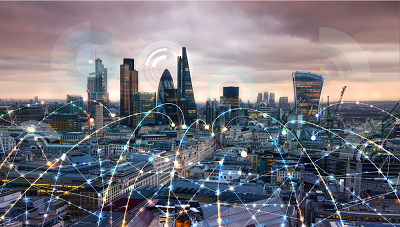Tackling Insecurity with Technology
By Shuaib Shuaib Agaka
It is obvious that the Nigerian government continues to search for solutions to unprecedented insecurities that have been disturbing the nation over the past years.
Amidst the quest for a way out, the Director General of the National Information Technology Development Agency (NITDA), Malam Abdullahi Kashifu Inuwa, has recently emphasised the need to integrate artificial intelligence (AI) into the security ecosystem.
The Director General made these remarks when he hosted the Commandant of the National Institute for Security Studies (NISS), Alhaji A. S. Adeleke, represented by Deputy Commandant D. E. Egbeji, at his office in Abuja.
Mr. Inuwa reiterated that the need for improved collaboration between the security industry and the startup ecosystem for increased efficiency and effectiveness can never be downplayed at this critical juncture.
“The way you do things in security is different from the way we do things in the information technology (IT) sector, but if we can work together, we can make things better by utilising the numerous opportunities that IT offers to leverage AI, IoT, and emerging technologies in strengthening the security sector.” The DG added.
Meanwhile, it is on record that Nigeria is a country with a variety of cultures and a promising economy, but its contemporary security problem is disheartening. These challenges, such as terrorism, banditry, and kidnapping, create a complicated and diverse threat situation. Right now, Nigeria is at a critical point, requiring smart and creative solutions to address these issues.
In terms of security challenges, terrorism takes centre stage as a formidable adversary for Nigeria. Characterised by violent actions aimed at creating fear and promoting political or ideological goals. These attacks do not just result in the loss of lives but also force communities to flee their homes, causing complicated humanitarian issues. Terrorism’s impact is felt in both urban and rural regions, making it a challenge for standard security approaches to curb or instill peace in the country.
Complementing the threat of terrorism is the surge in kidnapping, once an occasional occurrence, which has turned into a major criminal business.
The security issues did not arise recently; instead, they became significantly concerning a decade ago. As the day goes by, terrorists grow in innovation on ways of thriving their enterprises, while the country is purging and sacrificing a lot of resources, both financially and militarily, to curb the security problems.
Since traditional security approaches could not address the pressing security concerns, it is rational to think outside the box and seek modern solutions to contemporary security concerns. The key to that is the integration of technology into the security ecosystem.
Amid these complex security issues, technology should be viewed as an enhancer of traditional security methods. In today’s world, where the issues of insecurity have become more advanced and widespread around the country, adopting the latest technological solutions is a key strategy.
It is not just a small improvement but a massive change in how we deal with modern security challenges, recognising that our defences need to be flexible and adaptable, just like the threats we face.
Read Also:
One of the cornerstones of this technological evolution is the deployment of AI-powered surveillance systems. This system, equipped with sophisticated cameras and sensors, can be very advantageous for monitoring vast areas in real-time. AI-powered surveillance, which utilises sophisticated algorithms to analyse large volumes of data from various sources like CCTV cameras, drones, and sensors, allows security agencies to monitor vulnerable areas, critical infrastructure, and border regions with unparalleled precision.
Also, using systems of machine learning models can help identify patterns, anomalies, and potential threats, greatly improving overall situational awareness and making security forces stronger and better able to handle various types of threats.
This insecure technological solution is particularly beneficial in high-risk areas prone to criminal activities. Whether it is monitoring urban centres or border regions, Which, in return, can speed up the response time of security forces and also reduce the risk of false alarms.
Moreso, rural regions, often targeted by criminal organisations, can gain significant advantages from AI-powered surveillance. Drones equipped with AI algorithms can efficiently patrol these remote areas, offering a cost-effective means of monitoring. The ability to identify and track movements, such as those of smugglers or trespassers, strengthens border security and helps prevent cross-border criminal activities.
Furthermore, AI-powered surveillance is not limited to static monitoring. These systems can track dynamic scenarios, such as crowd movements during public events or traffic flow in urban areas. By recognising unusual patterns or behaviours, the technology can trigger alerts, enabling security forces to intervene promptly and prevent potential security incidents.
Another one of these insecure technological solutions is examining the role of biometric identification in Nigeria’s security landscape. It becomes evident that while the country possesses the infrastructure for biometric systems, there is considerable unused potential that can greatly enhance its influence.
Biometric identification technologies, encompassing fingerprint recognition, facial recognition, iris scans, and voice recognition, have been deployed to some degree. However, their full potential remains underutilised. This suggests that there is a requirement to combine and improve how biometric identification is used in the current security system.
Because of advancements in technology, particularly in the field of artificial intelligence, real-time biometric analysis can be integrated into surveillance systems. This would enable security forces to identify and track known threats dynamically, enhancing their overall situational awareness and response capabilities. The integration of AI-driven biometric surveillance can be a force in the quest to stay ahead of evolving security threats.
In the relentless battle against terrorism, the use of community-driven reporting applications can also be a game-changer. These apps make citizens actively participate in improving security, creating a network where the public and law enforcement can directly share information, significantly boosting overall security measures.
Additionally, apps designed for reporting suspicious activities would make citizens play an active role in their safety and that of their communities. These user-friendly platforms allow individuals to easily document and report incidents, share information, and receive real-time alerts from security agencies. This channel makes reporting quicker and more precise, facilitating quick responses to potential threats.
Moreover, the use of reporting apps encourages community engagement and shared responsibility. Citizens become essential contributors to the intelligence network, serving as the eyes and ears of law enforcement. This collaborative approach not only strengthens the relationship between the public and security agencies but also acts as a curb, as potential wrongdoers know that communities are actively involved in reporting and preventing criminal activities.
Therefore, in this era of digitization, which is powdered by the ongoing fourth industrial revolution, IR 4.0, and characterised by automation, the integration of tech solutions into Nigeria’s security landscape can never be overemphasised.
Shuaib S. Agaka, an NYSC member, writes from PRNigeria Centre Kano.




















